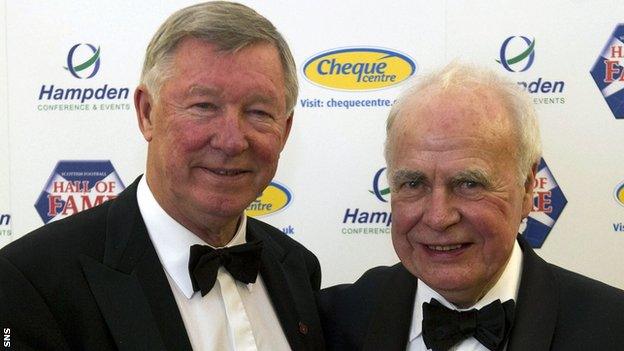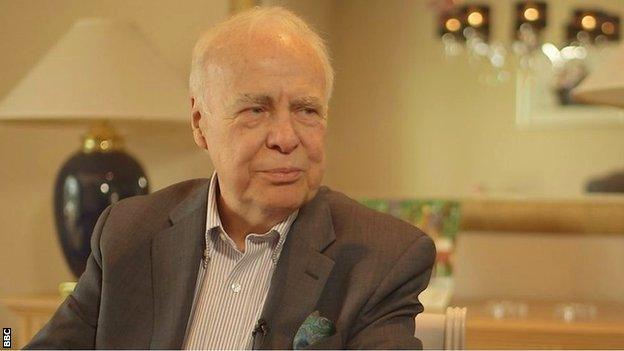Hugh McIlvanney: A tribute to 'greatest sportswriter of the English language'
- Published
- comments
Hugh McIlvanney worked as a journalist for 60 years
Warning - the section below contains language some readers may find offensive
It was the first day of November, 1995, and Hugh McIlvanney had lunched in the Ubiquitous Chip in Ashton Lane in the west end of Glasgow. Nothing but the best for the big man.
He was in town for Rangers' European Cup game against Juventus that evening. Cast in the happy role of his bag-carrier and taxi-caller, that was a special afternoon. A one-on-one audience with the colossus of the sportswriting game? A chance to pick his brains and listen to his wisdom? Bliss.
In the press room before the match, maybe 20 minutes to kick-off, Walter Smith, the Rangers manager, popped his head in the door, called out "Hughie" and invited McIlvanney backstage.
He took him to the tunnel and stood with him as the teams walked past on their way to the field. "Look at the f****** size of them," said Smith, in admiration of the 11 Adonises in black and white.
Word went around the press room that Hugh was getting special treatment. Privileged access before the match and a one-on-one with Smith afterwards. Normally this would have caused a thermonuclear reaction among the hacks.
Instead, everybody present just shrugged. "Fair enough, it's McIlvanney," was the gist. "That's different, eh?"
'Ali rolled away the rock and hit Foreman on the head with it'
When the news of Hugh's death broke in the early hours of Friday the first urge was to spend the rest of the night with the lamp on poring through his wondrous anthologies on football, boxing and horse racing, a vigil from darkness into light that would have left you both exhausted and exhilarated at the same time.
To be fair, there probably wasn't any need. Many, many people out there could quote from memory some of the passages from the astounding body of work that the genius leaves behind. To borrow from his own parlance, with the vivid delivery, 'Hugh McIlvanney could plaaay...'.
On the Rumble in the Jungle: "We should have known that Muhammad Ali would not settle for any ordinary resurrection. His had to have an additional flourish. So, having rolled away the rock, he hit George Foreman on the head with it."
On Scottish fighting men: "Anyone who suggests that the Scots are infatuated with their own image as fighting men has failed to distinguish infatuation and the real thing. On the corner of any one of a thousand grey streets from Wick to Berwick-upon-Tweed you are in danger of finding people who will earnestly ponder the question of whether it would take one or two Scottish regiments to cope with the Red Army and who will argue persuasively that Benny Lynch, if caught on a sober night, would have floored Muhammad Ali in mid-shuffle."
On Dawn Run winning the 1986 Cheltenham Gold Cup: "The rest of humanity had better be wary from now on of the 42,000 of us who were on Cheltenham racecourse last Thursday. We cannot begin to guarantee that our babblings of what we saw there will not be sufficiently relentless to clear bars, cause communication cords to be grabbed on trains or tempt fellow passengers on aeroplanes to head for the exit at 35,000 feet."
On Johnny Owen, the Welsh bantamweight who died after a title fight in Los Angeles in 1980: "Outside the ring he was an inaudible and almost invisible personality. Inside, he became astonishingly positive and self-assured. He seemed to be more at home there than anywhere else. It is his tragedy that he found himself articulate in such a dangerous language."
In this game, he leaves behind a hole the size of a crater. Since his sad passing at age of 84, McIlvanney has been saluted by turns as the finest sportswriter of his generation, the finest British sportswriter in history and the greatest sportswriter in the English language.
If non-English speaking countries would care to put up a candidate against him then they're welcome.

Sir Alex Ferguson with Hugh McIlvanney in 2011 after the sportswriter was inducted into the Scottish Football Hall of Fame
A man who produced fine literature, just about sport
The reality is that to call McIlvanney a sportswriter doesn't quite cut it, no more than Norman Mailer was a sportswriter or George Plimpton was a sportswriter or Gay Talese was a sportswriter, no more than David Halberstam, Bill Nack and Mark Kram, three more of the outrageously talented band of writers who came together so often in the 1960s and 1970s, can be pigeon-holed in one way or another.
Sure, some of those other guys wrote about things other than sport, but in their own country, America, they are literary figures of huge substance and McIlvanney should be remembered in the same breath - a man who produced fine literature, which happened to be about sport.
On the Lisbon Lions: "Today Lisbon is almost, but not quite, back in Portuguese hands at the end of the most hysterically exuberant occupation any city has ever known."
On the death of Jock Stein: "The larcenous nature of death, its habit of breaking in on us when we are least prepared and stealing the irreplaceable, has seldom been more sickeningly experienced than at Ninian Park, Cardiff on Tuesday night."
On the death of Bill Shankly: "Opponents of Liverpool Football Club would be rash to assume that they have done with Bill Shankly. Once Bill's ashes have been scattered on the pitch at Anfield any visiting forward who is setting himself to score an important goal is liable to find suddenly that he has something in his eye."
On the death of Matt Busby: "In the language of the sports pages, greatness is plentiful. The reality of sport, like that of every other area of life, shows that it is desperately rare. Greatness does not gad about, reaching for people in handfuls. It settles deliberately on a blessed few, and Matt Busby was one of them."
On Ally MacLeod: "If, as every Englishman suspects, the Scots ingest a weakness for hyperbole with their mother's milk, Ally MacLeod would seem to have been breast-fed until he was 15."
On Diego Maradona: "If there is an effective way of killing off the threat of Diego Maradona by marking him, it probably involves putting a white cross over his heart and tethering him to a stake in front of a firing squad."
'A big man with a wee coat'
Hugh brought perfectionism to the level of obsession - and what an example he was in this way and so many other ways.
As a young trainee in the old Wapping I recall a Saturday afternoon - in fact, many Saturday afternoons - when the most arduous task of the week could be put off no longer. Somebody had to phone Hugh and tell him that a comma or a hyphen or a semi-colon might have to be moved from his copy, that a few words might have to be trimmed.
Experienced editors buried their heads.
"I'm not doing it..."
"It's your turn..."
"No, it isn't..."
His towering back catalogue in the Observer and the Sunday Times became easier to locate when his anthologies were published between 1994-1996. His voice - make that His Voice - has been preserved for all-time in documentaries and interviews, among them a six-part series on his life and times in the writing game produced by BBC Scotland.
Thank goodness for that. It's not a surprise that so many people say that when reading a McIlvanney piece they do so with his remarkable voice playing in their head.
Hugh used to talk about his mother, a remarkable woman of integrity and strength and wisdom, a woman he clearly idolised.
When he became a famous writer she was having no airs and graces transported up from his new life in London. "Aye, you're a big man but a wee coat fits ye," she'd say.
It's easy to see where he got the brilliance from. Sports journalism will never see another writer fit to light Hugh McIlvanney's cigar.

Hugh McIlvanney, who passed away on Friday, aged 84